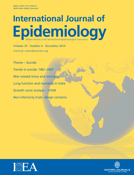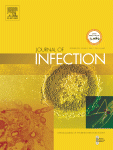Related Research Articles

Epidemiology is the study and analysis of the distribution, patterns and determinants of health and disease conditions in a defined population.
James (Jim) Chin is a public health epidemiologist. He works in public health surveillance and prevention of communicable diseases, particularly AIDS.

Michael Thomas Osterholm is an American epidemiologist, Regents Professor at the University of Minnesota School of Public Health, and director of the Center for Infectious Disease Research and Policy at the University of Minnesota.

The European Centre for Disease Prevention and Control (ECDC) is an agency of the European Union (EU) whose mission is to strengthen Europe's defences against infectious diseases. It covers a wide spectrum of activities, such as: surveillance, epidemic intelligence, response, scientific advice, microbiology, preparedness, public health training, international relations, health communication, and the scientific journal Eurosurveillance. The centre was established in 2004 and is headquartered in Solna, Sweden.
The European Programme for Intervention Epidemiology Training (EPIET) Fellowship provides training and practical experience in intervention epidemiology at the national centres for surveillance and control of communicable diseases in the European Union. The fellowship is aimed at EU medical practitioners, public-health nurses, microbiologists, veterinarians and other health professionals with previous experience in public health and a keen interest in epidemiology.
Clinical Infectious Diseases is a peer-reviewed medical journal published by Oxford University Press covering research on the pathogenesis, clinical investigation, medical microbiology, diagnosis, immune mechanisms, and treatment of diseases caused by infectious agents. It includes articles on antimicrobial resistance, bioterrorism, emerging infections, food safety, hospital epidemiology, and HIV/AIDS. It also features highly focused brief reports, review articles, editorials, commentaries, and supplements. The journal is published on behalf of the Infectious Diseases Society of America. The editor-in-chief is infectious disease physician Paul Sax.

The International Journal of Epidemiology is a bimonthly peer-reviewed medical journal covering research in epidemiology. It is the official journal of the International Epidemiological Association and is published by Oxford University Press. The journal is a member of the Committee on Publication Ethics. The editor-in-chief is Stephen Leeder.
Eurosurveillance is an open-access medical journal covering epidemiology, surveillance, prevention, and control of communicable diseases with a focus on topics relevant for Europe. The journal is a non-profit publication and is published by the European Centre for Disease Prevention and Control.
The European Association of Science Editors is a non-profit membership organisation for people interested in science communication and editing. Founded in 1982, in France, EASE has an international membership.

Eric Liang Feigl-Ding is an American public health scientist who is currently an epidemiologist and Chief of COVID Task Force at the New England Complex Systems Institute. He was formerly a faculty member and researcher at Harvard Medical School and Harvard T.H. Chan School of Public Health. He is also the Chief Health Economist for Microclinic International, and co-founder of the World Health Network. His research and advocacy have primarily focused on obesity, nutrition, cancer prevention, and biosecurity.

The Journal of Infection is a monthly peer-reviewed medical journal in the field of infectious disease, covering microbiology, epidemiology and clinical practice. Established in 1979, the journal was initially published quarterly by Academic Press. The first editor was Hillas Smith. The Journal of Infection is the official publication of the British Infection Association. Since 2006, the editor-in-chief has been Robert C. Read and the publisher is Elsevier.
Raman Viswanathan was an Indian chest physician, medical mycologist and pulmonologist, considered by many as the father of Chest Medicine in India. He was the founder director of Vallabhbhai Patel Chest Institute, a postgraduate medical institute based in Delhi. An elected fellow of the American College of Chest Physicians, Royal College of Physicians of London, Indian National Science Academy and the Academy of Medical Sciences, United Kingdom, he was a recipient of several honors including the Forlanini Medal by Italian Tuberculosis Association and the Eugeno Morelli Prize of the National Academy of Sciences, Italy. The Government of India awarded him the third highest civilian honour of the Padma Bhushan, in 1974, for his contributions to medicine.
The American Journal of Infection Control is a peer-reviewed scientific journal published by Elsevier on behalf of the Association for Professionals in Infection Control and Epidemiology. The journal publishes articles describing original research on the epidemiology, infection control, and infectious diseases. According to the 2020 Journal Citation Reports, the journal has a 2023 impact factor of 4.9.
The European Society of Clinical Microbiology and Infectious Diseases (ESCMID) is a non-profit international organization with headquarters in Basel, Switzerland. An important activity of the society is the organization of the annual scientific congress ESCMID Global.

Matthew L. Boulton is an American epidemiologist and physician. He currently serves as the Editor-in-Chief of the American Journal of Preventive Medicine, and is the former Chief Medical Executive, State Epidemiologist, and Director of the Bureau of Epidemiology for the State of Michigan. At the University of Michigan School of Public Health, Boulton is Senior Associate Dean for Global Public Health, the Pearl L. Kendrick Collegiate Professor of Global Health, and a Professor of Epidemiology, Professor of Preventive Medicine, and a Professor of Internal Medicine, Infectious Disease Division, at Michigan Medicine.
Robert Steffen is an Emeritus Professor at the Epidemiology, Biostatistics and Prevention Institute, University of Zurich, Switzerland and an adjunct professor at the University of Texas School of Public in Houston. He is an editor of the Journal of Travel Medicine.
Azra Catherine Hilary Ghani is a British epidemiologist who is a professor of Infectious Disease Epidemiology at Imperial College London. Her research considers the mathematical modelling of infectious diseases, including malaria, bovine spongiform encephalopathy and coronavirus. She has worked with the World Health Organization on their technical strategy for malaria. She is associate director of the MRC Centre for Global Infectious Disease Analysis.
Allison Joan McGeer is a Canadian infectious disease specialist in the Sinai Health System, and a professor in the Department of Laboratory Medicine and Pathobiology at the University of Toronto. She also appointed at the Dalla Lana School of Public Health and a Senior Clinician Scientist at the Lunenfeld-Tanenbaum Research Institute, and is a partner of the National Collaborating Centre for Infectious Diseases. McGeer has led investigations into the severe acute respiratory syndrome outbreak in Toronto and worked alongside Donald Low. During the COVID-19 pandemic, McGeer has studied how SARS-CoV-2 survives in the air and has served on several provincial committees advising aspects of the Government of Ontario's pandemic response.

Andrea Ammon is a German physician and the former director of the European Centre for Disease Prevention and Control (ECDC), a European Union (EU) agency strengthening Europe's defence against infectious disease. She advised the German government on the SARS and Influenza A virus subtype H2N2 outbreaks.
Raina MacIntyre is an Australian epidemiologist and academic. She is the Professor of Global Biosecurity within the Kirby Institute at University of New South Wales and a National Health and Medical Research Council Principal Research Fellow, who leads a research program on the prevention and control of infectious diseases. She is an expert media advisor and commentator on Australia's response to COVID-19.
References
- 1 2 Nicoll A (2011). "Eurosurveillance - fifteen years of serving Europe". Eurosurveillance. 16 (45). doi: 10.2807/ese.16.45.20015-en . Retrieved 3 September 2020.
- ↑ "Vom Tier zum Menschen Haustiere können Reservoir für Krankheitserreger sein - Einige dieser als Zoonosen bezeichneten Krankheiten können sogar gefährlich werden". 28 March 2007. Retrieved 7 April 2021.
- ↑ "European Scientific Conference on Applied Infectious Disease Epidemiology (ESCAIDE) 2013 Abstract book" . Retrieved 8 April 2021.
- ↑ "Emerging Infectious Diseases 2015 Year in Review" (PDF). Retrieved 7 April 2021.
- ↑ "Editorial Advisory Board" . Retrieved 7 April 2021.
- ↑ "Gender Policy Committee". European Association of Science Editors . Archived from the original on 7 October 2018. Retrieved 11 June 2024.
- ↑ Squazzoni, Flaminio (14 November 2017). "EASE has established a peer review committee in which Peere is represented" . Retrieved 8 April 2021.
- ↑ "European Science Editing 94 Meeting reports President's report EASE AGM" (PDF). November 2019. Retrieved 7 April 2021.
- ↑ "EASE Virtual Conference 2: The realities of being an editor in a time of crisis". 28 June 2020. Retrieved 8 April 2021.
- ↑ Steffens, Ines (1994). "Langzeitergebnisse femoro-poplitealer Bypassoperationen: eine retrospektive Analyse/vorgelegt von Ines Steffens" . Retrieved 8 April 2021.
- ↑ "Offener Brief Studierende und Absolventen des Studienganges Public Health in Berlin" (PDF). VDPP Rundbrief - Mitteilungen des Vereins demokratischer Pharmazeutinnen und Pharmazeuten. 51: 31–32. 2000. Retrieved 8 April 2021.